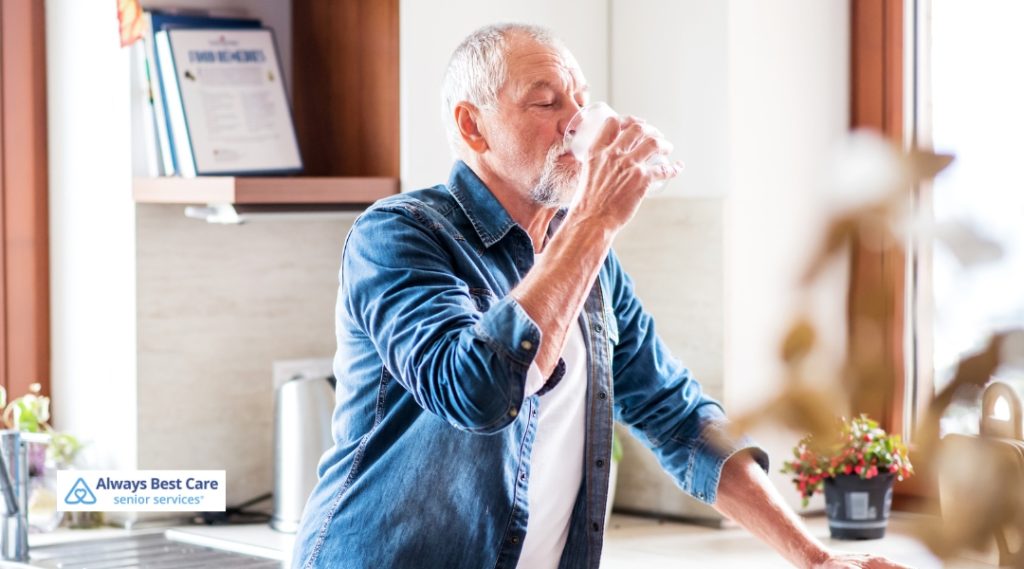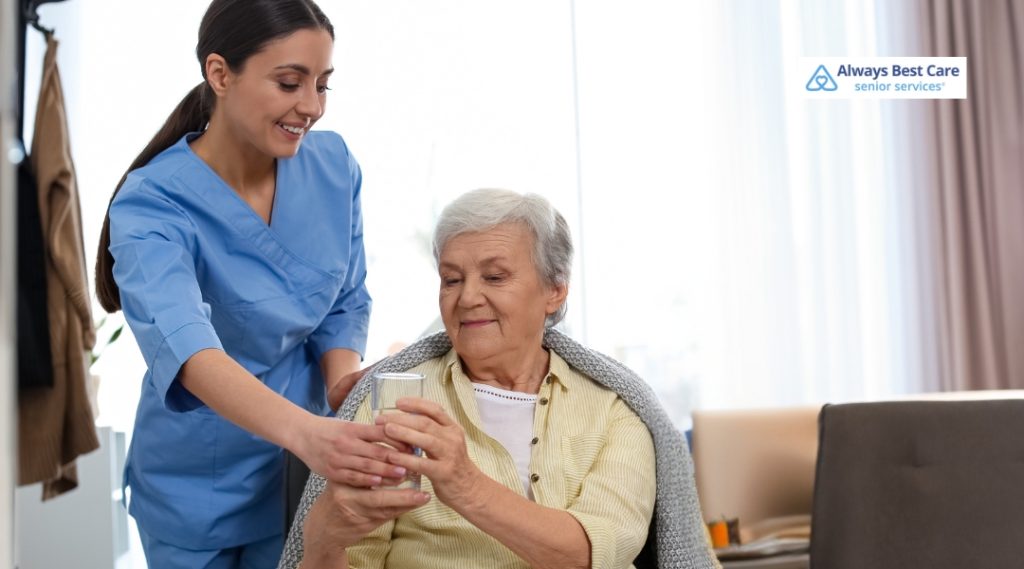Hydration Heroes: Why Seniors Should Sip More Water

Staying hydrated isn’t always at the top of our to-do lists, but for seniors, it’s a game-changer.
As we grow older, our bodies undergo natural changes that can leave us more susceptible to dehydration.
With National Hydration Day coming up on June 23rd, there’s no better time to talk about why our older loved ones need to keep those water glasses full.
At Always Best Care of Framingham, we’ve seen firsthand how proper hydration can transform a senior’s energy, mood, and overall health.
What you will learn:
- Why hydration is especially crucial for seniors and how it impacts energy, cognitive function, digestion, mobility, and overall health.
- Creative and practical strategies to help seniors increase their daily fluid intake and make hydration enjoyable.
- The role of in-home caregivers in supporting senior hydration, including monitoring, reminders, and personalized care routines.
Table of Contents
Why Water Matters More for Seniors
Water isn’t just refreshing; it’s essential for nearly every bodily function. For seniors, staying hydrated is particularly important for several key reasons:
Boosting Energy and Stamina
You know that mid-afternoon slump? For seniors, even mild dehydration can make fatigue ten times worse.
Water helps maintain proper blood volume, which means oxygen gets transported more efficiently throughout the body.
The result?
More pep in their step and energy to enjoy daily activities.

Keeping the Mind Sharp
Ever felt foggy-headed when you haven’t had enough to drink?
For seniors, especially those already experiencing cognitive changes, dehydration can worsen confusion, memory problems, and concentration.
A well-hydrated brain simply works better, helping your loved one stay mentally alert and engaged.
Supporting Digestive Comfort
Nobody likes talking about constipation, but it’s a common issue for seniors. Water keeps things moving smoothly through the digestive tract. Without enough fluids, digestion slows down, leading to discomfort that can affect everything from appetite to sleep quality.
Maintaining Mobility
Creaky joints?
Water acts as nature’s lubricant, helping to keep joints and muscles functioning properly.
Seniors who stay hydrated often report less stiffness and better mobility, which means more independence and activity.
Strengthening Overall Health
From regulating body temperature to supporting kidney function and flushing out toxins, proper hydration is a cornerstone of good health.
It can even help maintain skin elasticity (yes, water is nature’s beauty secret!) and support immune function, which naturally weakens with age.
5 Creative Ways to Increase Fluid Intake
If your loved one turns up their nose at plain water, don’t worry! There are plenty of ways to make hydration more appealing:
- Infuse water with fresh fruits, herbs, or cucumber slices for natural flavor.
- Offer warm options like herbal tea or clear broths.
- Serve water-rich foods such as watermelon, strawberries, oranges, and cucumber.
- Use colorful or special cups that make drinking more enjoyable.
- Set up a hydration station in frequently visited areas of the home.

How In-Home Care Makes a Difference
At Always Best Care of Framingham, our caregivers become hydration champions for your loved ones. We understand that sometimes seniors need gentle reminders and support to maintain healthy habits.
Our professional caregivers can:
- Prepare hydrating meals and beverages throughout the day.
- Offer regular, friendly reminders to sip water.
- Monitor for signs of dehydration, like dry mouth, headaches, or dark urine.
- Help address barriers like mobility issues that might limit access to drinks.
- Track fluid intake to ensure daily goals are met.
FAQ About Senior Hydration
Q: How much water should seniors drink daily?
A: While the standard “eight glasses a day” is a good starting point, individual needs vary based on weight, medications, activity level, and health conditions. Always consult with a healthcare provider for personalized recommendations.
Q: What are the warning signs of dehydration in seniors?
A: Watch for dry mouth, decreased urination, dark-colored urine, dizziness, confusion, fatigue, and increased heart rate. Severe dehydration requires immediate medical attention.
Q: Can coffee and tea count toward daily fluid intake?
A: Yes, but in moderation. While caffeinated beverages have a mild diuretic effect, they still contribute to overall hydration. Herbal teas and decaffeinated options are excellent alternatives.
Q: My loved one doesn’t like drinking water. What can I do?
A: Try flavoring water naturally, offering water-rich foods, or finding a special cup they enjoy using. Sometimes the simple act of making hydration more appealing can make a big difference.

Make Senior Hydration a Priority!
Keeping your senior loved one well-hydrated isn’t complicated, but it does require attention and care. At Always Best Care of Framingham, we’re committed to supporting seniors’ health through personalized in-home care services that address all aspects of well-being, including proper hydration.
Contact Always Best Care of Framingham at (508) 626-8300 to learn more and schedule your free consultation.





